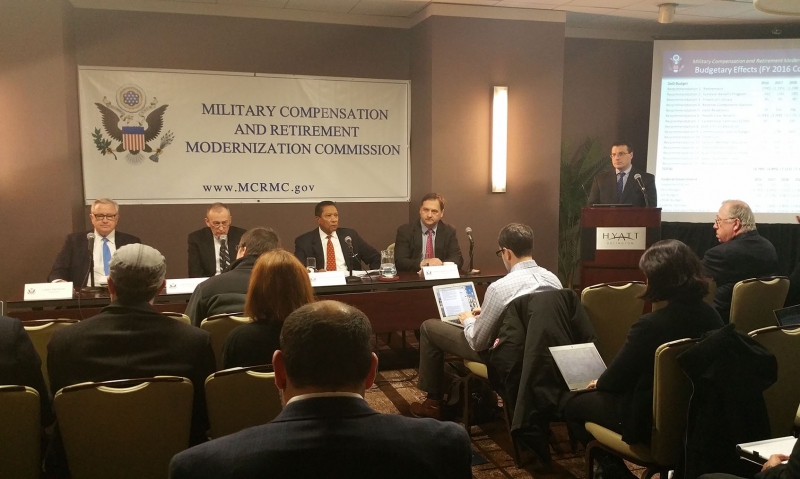
The American Legion is currently reviewing the Military Compensation and Retirement Modernization Commission's comprehensive report.
The Military Compensation and Retirement Modernization Commission recently released a comprehensive report reviewing military compensation and retirement benefits.
In a recent statement, President Barack Obama said he will review the commission's proposals and gather feedback on the recommendations from senior and military leadership. “In September 2013, I asked the Commission to focus on protecting the long-term viability of the All-Volunteer Force, improving quality-of-life for servicemembers and their families, and ensuring the fiscal sustainability of the compensation and retirement systems," Obama said. "Our men and women in uniform and their families deserve nothing less.”
The commission compiled input and suggestions from more than 150,000 servicemembers and veterans nationwide over a two year period, guiding their decisions to suggest 15 reform recommendations to modify benefits for future troops and systems already in place for men and women currently serving.
Those serving presently would have the option to elect into the proposed changes if they were mandated by Congress. The commission is working to grandfather current troops and retirees in regards to their new proposals for retirement pay. The recommendations also aim to bolster recruitment and retention amidst the current budget constraints, and potentially affect those who have taken off their uniform and are taking advantage of the benefits they earned through their service.
In their recommendations, the commission offered a reconstructed retirement plan allowing servicemembers to collect 2 percent of their basic pay as long as they complete at least 20 years, versus the current rate of 2.5 percent, for every year served, upon retirement. Eight out of 10 troops who leave the service before their 20-year mark generally don't receive retirement pay. The commission countered that plan by also suggesting an option similar to a 401(k), automatically enrolling servicemembers into a contribution plan through the Thrift Savings Plan with a contribution of at least 3 percent of their base pay. Those enrolled will have the option to opt out, but will automatically be re-enrolled every year.
Active-duty troops who serve 12 years would be able to collect a lump-sum payment of 2.5 months of basic pay if they agree to an additional four-year contract. Those who choose to retire after a minimum of 20 years would have three retirement options to pick from. They could choose to draw a monthly annuity, a small sum up front and a smaller monthly check, or a large lump sum with no monthly payout option.
Active-duty TRICARE coverage of family members who don't serve in the military would also be transferred to private health care plans, while the servicemember would receive monthly Basic Allowance for Health Care to obtain health care, and would contribute toward copays and other out-of-pocket expenses.
Retirees under the age of 65 and their dependents would no longer be covered under TRICARE and would have other private health-care options comparable to the Federal Employees Health Benefit Program. Retirees over the age of 65 would remain on TRICARE for Life, and the TRICARE Dental Program would not see any changes.
Highlights of these recommendations would afford reservists and inactive reservists and their families opportunities to take advantage of other private health-care options. Base exchanges and commissaries could also see changes, integrating those facilities, consolidating staff, logistics and space. Space-A travel would also be expanded to include family members or troops deployed more than 30 days.
In a release, members of the commission said, “We are unanimous in our belief that our recommendations strengthen the foundation of the all-volunteer force and ensure our national security, now and into the future.”
While the recommendations of the commission are just that at the moment – recommendations – The American Legion has always supported quality-of-life features for members of the armed forces, their dependents and military retirees.
“We oppose any legislation that would degrade the readiness and viability of the all-volunteer force,” said John Stovall, director of The American Legion's National Security Division. “Although we may not always agree, the commission’s recommendations are now being scrutinized by the White House and Congress.”
Obama stated that he looks forward to working with Congress to strengthen and modernize military compensation and retirement systems.
The Legion is closely reviewing the recommendations.
- Security

